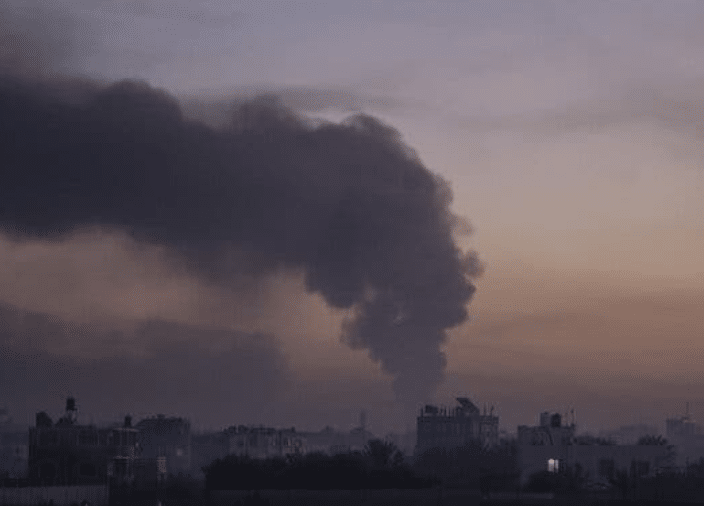To understand the secret negotiations, New York Times reporters spoke to more than a dozen diplomats and officials from seven nations and the Palestinian Authority.
Top officials from at least 10 different administrations are trying to forge a head-spinning set of deals to end the Gaza war and answer the divisive question of how the territory will be governed after the fighting stops.
The narrowest set of major discussions is focused on reaching a cease-fire between Israel and Hamas. This would involve the exchange of more than 100 Israeli hostages held by Hamas for a cease-fire and thousands of Palestinians detained in Israeli jails.
A second track centers on reshaping the Palestinian Authority, the semiautonomous body that administers parts of the Israeli-occupied West Bank. American and Arab officials are discussing overhauling the leadership of the authority and having it take control of Gaza after the war ends, assuming power from Israel and Hamas.
In a third track, American and Saudi officials are pushing Israel to agree to conditions for the creation of a Palestinian state in exchange for Saudi Arabia forging formal ties with Israel for the first time ever.
[The New York Times Report continues]
Officials from the U.S., Israel, Egypt and Qatar are discussing a deal that would pause the fighting for up to two months. In November, the parties agreed to a brief pause that resulted in Hamas releasing more than 100 hostages.
In one proposal, the hostages would be released in phases during a pause of up to 60 days in exchange for Palestinians jailed by Israel. Some officials have suggested Israeli civilians would be released first, in exchange for Palestinian women and minors detained by Israel.
Then captured Israeli soldiers would be exchanged for Palestinian militant leaders serving long-term sentences.
Diplomats on various sides say they hope that more detailed discussions could be held during the pause about a permanent truce that might involve the withdrawal of most or all Israeli troops, the departure of Hamas’s leaders from the strip and a transition of power to the Palestinian Authority. For now, Israel and Hamas have each rejected some of those conditions.
To try to advance these negotiations, William J. Burns, the C.I.A. director, plans to meet in Europe in the coming days with senior Israeli, Egyptian and Qatari counterparts.
Some observers hope that the World Court’s call on Friday for Israel to comply with the Genocide Convention will give momentum and political cover to Israeli officials who are pushing internally to end the war.
2. Overhaul the Palestinian Authority
The Palestinian Authority briefly controlled Gaza after Israeli troops left in 2005, but Hamas forced it from power two years later. Now, some want the authority to return to Gaza and play a role in postwar governance. To make that idea more appealing to Israel, which opposes it, there is a push by the United States, Jordan, Egypt, Saudi Arabia and other Arab states to overhaul the authority and change its leadership.
Under its current president, Mahmoud Abbas, 88, the authority is widely perceived as both corrupt and authoritarian. Mediators are encouraging him to take a more ceremonial role and to cede executive power to a new prime minister who could oversee Gaza’s reconstruction and reduce corruption. U.S. officials say the goal is to make the authority a more plausible administrator of a future Palestinian state. Israeli officials also assert that the authority needs to change its education system, which they say does not promote peace, and end welfare payments to those convicted of violence against Israelis.
Some critics of Mr. Abbas want him replaced by Salam Fayyad, a Princeton professor credited with modernizing the authority during a stint as prime minister a decade ago, or Nasser al-Kidwa, a former Palestinian envoy to the U.N. who broke with Mr. Abbas three years ago. But diplomats say Mr. Abbas is pushing for a candidate over whom he has more influence, like Mohammad Mustafa, his longtime economic adviser.
[The New York Times Report continues]
These new terms were first voiced publicly by Mr. Blinken after he met with Prince Mohammed in a desert tent camp in Saudi Arabia this month. He delivered them to Prime Minister Benjamin Netanyahu of Israel after flying from there to Tel Aviv. He reiterated them again in a public talk at Davos, Switzerland, as did Jake Sullivan, the White House national security adviser.
Mr. Netanyahu has publicly rejected that proposal — pledging recently to maintain Israel’s military control of the entirety of the West Bank and Gaza. Many Israelis support that, although some U.S. officials wonder whether it is an opening bargaining position by Mr. Netanyahu.
To reassure the Saudis and the Palestinians, some officials have suggested a U.N. Security Council resolution, backed by the United States, that would enshrine the Palestinians’ right to sovereignty. But the idea has yet to gain traction.
There is also the question of whether the Biden administration can deliver a Senate-approved mutual defense treaty to Prince Mohammed. Some Democratic senators have already raised concerns about such a treaty. And the chances that Republican senators will oppose it are expected to grow as the November U.S. presidential election draws closer.
Patrick Kingsley reported from Abu Dhabi, and Edward Wong from Washington. Reporting was contributed by Aaron Boxerman, Adam Rasgon and Isabel Kershner from Jerusalem; Ronen Bergman from Tel Aviv; Farnaz Fassihi from New York; and Julian E. Barnes from Washington.
Patrick Kingsley is the Jerusalem bureau chief, covering Israel and the occupied territories. He has reported from more than 40 countries, written two books and previously covered migration and the Middle East for The Guardian. More about Patrick Kingsley

